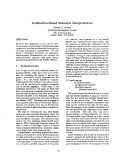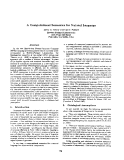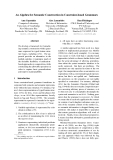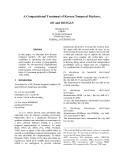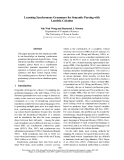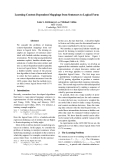
Lambda calculus
-
Part 2 of ebook "Guide to discrete mathematics: An accessible introduction to the history, theory, logic and applications" provides readers with contents including: Chapter 10 - Cryptography; Chapter 11 - Coding theory; Chapter 12 - Language theory and semantics; Chapter 13 - Computability and decidability; Chapter 14 - A short history of logic; Chapter 15 - Propositional and predicate logic; Chapter 16 - Advanced topics in logic; Chapter 17 - Software engineering mathematics; Chapter 18 - Formal methods; Chapter 19 - Z formal specification language; Chapter 20 - Probability, statistics and...
 208p
208p  daonhiennhien
daonhiennhien
 03-07-2024
03-07-2024
 3
3
 1
1
 Download
Download
-
This book touches on several large areas in mathematics, including computability and mathematical logic. I have picked and chosen only those topics and concepts most relevant to understanding Turing's paper. Many details are omitted, and this book is no substitute for the rigor and depth you'll find in dedicated books on the subjects of computability and logic. Those readers interested in delving further into these fascinating areas of study can consult the bibliography for guidance.
 385p
385p  haojiubujain08
haojiubujain08
 01-11-2023
01-11-2023
 6
6
 2
2
 Download
Download
-
Ebook "Formal syntax and semantics of programming languages" includes content: Specifying syntax, introduction to laboratory activities, attribute grammars, two level grammars, the lambda calculus, self definition of programming languages, translational semantics, traditional operational semantics,.... and other contents.
 654p
654p  haojiubujain07
haojiubujain07
 20-09-2023
20-09-2023
 4
4
 3
3
 Download
Download
-
The contents of this chapter include all of the following: Functions and the lambda calculus; haskell: Introduction, expressions, lists and list comprehensions, elementary types and values, control flow, defining functions, tuples.
 20p
20p  larachdumlanat122
larachdumlanat122
 26-11-2020
26-11-2020
 19
19
 0
0
 Download
Download
-
Chapter 14 - Functional programming. The main contents of chapter 14c include all of the following: Functions and the lambda calculus; haskell: Introduction, expressions, lists and list comprehensions, elementary types and values, control flow, defining functions, tuples.
 21p
21p  thiendiadaodien_8
thiendiadaodien_8
 24-02-2019
24-02-2019
 17
17
 1
1
 Download
Download
-
Functional programming models a computational problem as a collection of mathematical functions, each with an input (domain) and a result (range) spaces. Functions interact and combine with each other using functional composition, conditionals, and recursion. Major functional programming languages are Lisp, Scheme, Haskell, and ML. Functional programming is discussed and illustrated in Chapter 14.
 18p
18p  thiendiadaodien_8
thiendiadaodien_8
 24-02-2019
24-02-2019
 30
30
 0
0
 Download
Download
-
Chapter 2 λ Calculus The λ (lambda) calculus [7] created by Church and Kleene in the 1930’s is at the heart of functional programming languages. We will use it as a foundation for sequential computation. The λ calculus is Turing-complete, that is, any computable function can be expressed and evaluated using the calculus. The λ calculus is useful to study programming language concepts because of its high level of abstraction. In the following sections, we will motivate the λ calculus and introduce its syntax and semantics (Section 2.1,) present the notion of scope of variables (Section 2.
 18p
18p  quangdat88
quangdat88
 05-07-2013
05-07-2013
 62
62
 2
2
 Download
Download
-
We show how unification can be used to specify the semantic interpretation of natural-language expressions, including problematical constructions involving long-distance dependencies. We also sketch a theoretical foundation for unificationbased semantic interpretation, and compare the unification-based approach with more conventional techniques based on the lambda calculus.
 9p
9p  bungio_1
bungio_1
 03-05-2013
03-05-2013
 48
48
 1
1
 Download
Download
-
In the new Head-driven Phrase Structure G r a m m a r (HPSG) language processing system that is currently under development at Hewlett-Packard Laboratories, the Montagovian semantics of the earlier GPSG system (see [Gawron et al. 19821) is replaced by a radically different approach with a number of distinct advantages.
 8p
8p  bungio_1
bungio_1
 03-05-2013
03-05-2013
 45
45
 1
1
 Download
Download
-
We develop a framework for formalizing semantic construction within grammars expressed in typed feature structure logics, including HPSG. The approach provides an alternative to the lambda calculus; it maintains much of the desirable flexibility of unificationbased approaches to composition, while constraining the allowable operations in order to capture basic generalizations and improve maintainability.
 8p
8p  bunrieu_1
bunrieu_1
 18-04-2013
18-04-2013
 34
34
 2
2
 Download
Download
-
In this paper, we elucidate how Korean temporal markers, OE and DONGAN contribute to specifying the event time and formalize it in terms of typed lambda calculus. We also present a computational method for constructing temporal representation of Korean sentences on the basis of G grammar proposed by [Renaud, 1992;1996].
 8p
8p  bunbo_1
bunbo_1
 17-04-2013
17-04-2013
 38
38
 1
1
 Download
Download
-
This paper presents the first empirical results to our knowledge on learning synchronous grammars that generate logical forms. Using statistical machine translation techniques, a semantic parser based on a synchronous context-free grammar augmented with λoperators is learned given a set of training sentences and their correct logical forms. The resulting parser is shown to be the bestperforming system so far in a database query domain.
 8p
8p  hongvang_1
hongvang_1
 16-04-2013
16-04-2013
 36
36
 2
2
 Download
Download
-
The present paper proposes a method by which to translate outputs of a robust HPSG parser into semantic representations of Typed Dynamic Logic (TDL), a dynamic plural semantics defined in typed lambda calculus. With its higher-order representations of contexts, TDL analyzes and describes the inherently inter-sentential nature of quantification and anaphora in a strictly lexicalized and compositional manner. The present study shows that the proposed translation method successfully combines robustness and descriptive adequacy of contemporary semantics. ...
 8p
8p  hongvang_1
hongvang_1
 16-04-2013
16-04-2013
 63
63
 1
1
 Download
Download
-
We consider the problem of learning context-dependent mappings from sentences to logical form. The training examples are sequences of sentences annotated with lambda-calculus meaning representations. We develop an algorithm that maintains explicit, lambda-calculus representations of salient discourse entities and uses a context-dependent analysis pipeline to recover logical forms. The method uses a hidden-variable variant of the perception algorithm to learn a linear model used to select the best analysis.
 9p
9p  hongphan_1
hongphan_1
 14-04-2013
14-04-2013
 53
53
 5
5
 Download
Download
CHỦ ĐỀ BẠN MUỐN TÌM








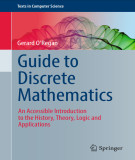

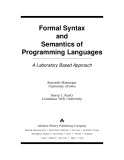
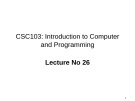
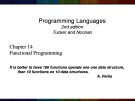
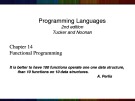
![Chapter 2λ CalculusThe λ (lambda) calculus [7] created by Church and Kleene in the 1930’s is at the heart of functional programming languages. We will use it as a foundation for sequential computation. The λ calculus is Turing-complete, that is, any co Chapter 2λ CalculusThe λ (lambda) calculus [7] created by Church and Kleene in the 1930’s is at the heart of functional programming languages. We will use it as a foundation for sequential computation. The λ calculus is Turing-complete, that is, any co](https://tailieu.vn/image/document/thumbnail/2013/20130705/quangdat88/135x160/4311372992296.jpg)
